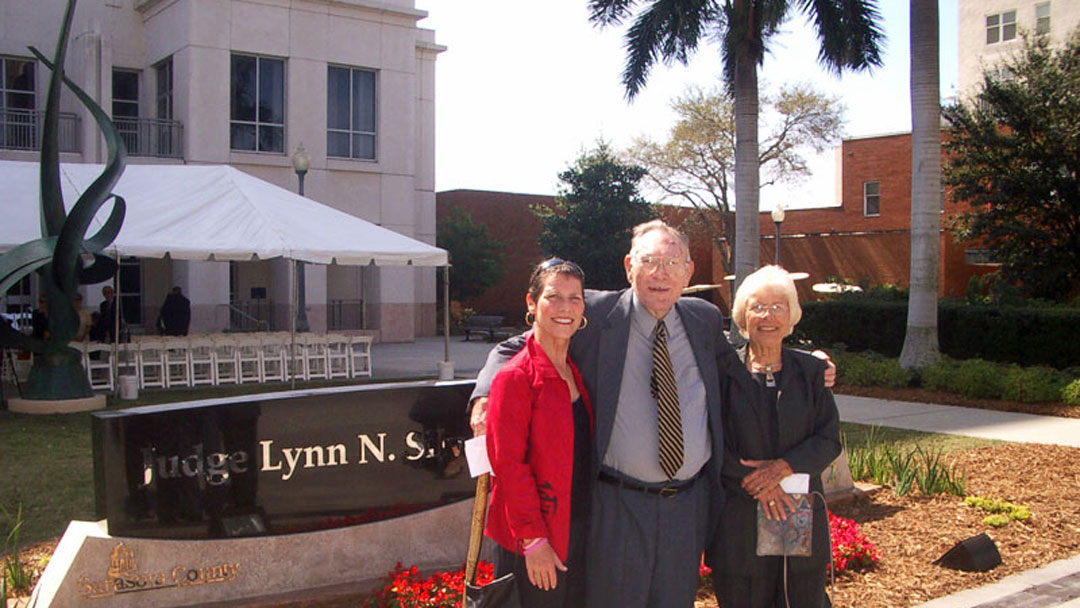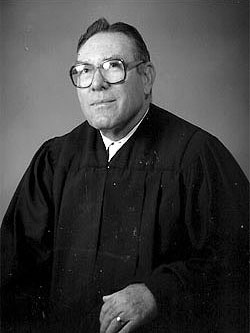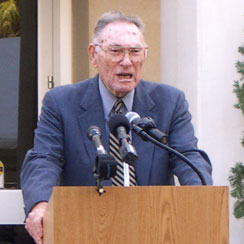 In this file photo, retired Judge Lynn Silvertooth poses with his wife, Betty, and daughter, Sandy, after a ceremony to rename the judicial center in his honor.
In this file photo, retired Judge Lynn Silvertooth poses with his wife, Betty, and daughter, Sandy, after a ceremony to rename the judicial center in his honor.
A building worthy of his name
The local judiciary unanimously voted to rename the Sarasota court facility as a tribute to the ‘legend of the bench’
A lifelong resident of Sarasota, Judge Silvertooth was first appointed as a Twelfth Judicial Circuit Court judge in 1964 by then Governor Farris Bryant. At the time, the Twelfth Judicial Circuit encompassed eight counties: Sarasota, Manatee, Desoto, Charlotte, Lee, Collier, Glades, and Hendry. Judge Silvertooth served unopposed as a circuit judge until his retirement in 1988.
Judge Silvertooth attended both Bradenton High School and Sarasota High School. After his first year of college, Judge Silvertooth enlisted in the United States Marine Corps where he served in combat in the South Pacific. After the war, Judge Silvertooth entered the University of Florida where he received a B.A. and a J.D. in 1949. Upon graduation from law school, Judge Silvertooth returned to Sarasota and joined the law firm of Clyde Wilson, Sr. to practice law.

In the 1950s, Judge Silvertooth was appointed as an assistant state attorney under State Attorney Mac Smiley, even while continuing his civil private practice. Interestingly, assistant state attorneys at the time were appointed by the governor, not by the state attorney. Judge Silvertooth was one of only two assistant state attorneys for the 8-county circuit and thus spent a lot of time traveling the circuit to prosecute felony charges. It was during this time that Judge Silvertooth prosecuted a high-profile murder which occurred in the old Lynn Hotel. The defendant had the victim’s wallet and was driving the victim’s car when Sheriff Ross Boyer caught up with him. He was tried and convicted in the only courtroom in the Sarasota County Courthouse and was sentenced to die in the electric chair.
In 1964, when Judge Silvertooth was appointed a circuit court judge, there were only six circuit judges in the 8-county judicial circuit. One of the assignments first given to Judge Silvertooth was to hear all the condemnation cases throughout the circuit.
In his first years as a judge, he was assigned to try the Carl Coppolino case in Sarasota. The Coppolino case was Sarasota’s first murder case that garnered worldwide attention and thrust the city and the judge into the media spotlight. The trial itself had to be moved to Naples because of the extensive pretrial publicity and it took four weeks to complete. One of the defense attorneys was a young lawyer named F. Lee Bailey, who Judge Silvertooth had to hold in contempt for his behavior in the courtroom. Coppolino was found guilty and sentenced to life in prison and the case was memorialized by writer John C. MacDonald in his book, “No Deadly Drug.”
In the late 1960s, Judge Silvertooth was again on the bench for another high-profile murder case where the maid of one of Sarasota’s most prominent bankers, Emmett Addy, was murdered in Addy’s home in Cherokee Park. The murder sent shock waves throughout the area, causing people to stay in their homes until the suspect, Fred Domau, was arrested. Fred Domau was convicted and given a life sentence by Judge Silvertooth.
However, one of the most prominent cases Judge Silvertooth was involved in occurred in 1971 and 1972 in Miami. It was called the “Miami Market Street Connection” case. The mayor and vice mayor, as well as two circuit court judges, were accused of taking payoffs from a Mafia “boss.” Governor Reuben Askew requested that Judge Silvertooth go to Miami and try the case. Gerald Kogan, who later became a Chief Justice of the Florida Supreme Court, and Irwin Block, who was then president of the Dade County Bar Association, were part of the defense attorney team. Two different trials were necessary. In the first trial the jury found the defendants were not guilty. In the second trial, Judge Silvertooth directed a verdict of not guilty in the case.
Judge Silvertooth had always been active in numerous legal and civic organizations in Sarasota, throughout the State of Florida, and across the country. Before he became a judge, Judge Silvertooth was president of the Twelfth Circuit Bar Association as well as the Sarasota County Bar Association. He served as vice chairman of the Florida Bar Fair Trial — Free Press Committee when that committee first recommended that cameras be allowed in courtrooms during trials. He lectured extensively both at the Florida Circuit Court Judges Conference and at the National Judicial College in Reno, Nevada, where he also served as a faculty advisor. He chaired the Sarasota County Law Library Committee for over 20 years.

Judge Silvertooth served as chief judge of the Twelfth Judicial Circuit and was at the helm during some major changes. In 1972, as a result of a constitutional amendment, the Florida Legislature reorganized Florida’s court system, abolishing local courts in favor of a state courts system. Local “Justice of the Peace Courts” as well as “Municipal Courts” were abolished and all cases were moved from the cities to the counties. The non–lawyer Justices of the Peace — Sarasota had George Fosler who was a welder — duties were transferred to newly-created county court judges. As chief judge, Judge Silvertooth also was responsible for organizing the bailiff system in Sarasota and, in 1976, hired the first court administrator for the Twelfth Judicial Circuit, which by that time had been reconstituted to include Sarasota, Manatee and Desoto counties.
Judge Silvertooth was always known as a hard-working and fun-loving person. He particularly liked to fish and play tennis. During his judicial tenure he became very well known, being asked to serve as a Court of Appeals judge over 50 times, and was one of the most respected jurists in the state. Judge Silvertooth was known for being a tough but fair judge, treating everyone equally and with courtesy. He had a very good grasp of the law and would make rulings swiftly when warranted.
And so, in a ceremony held on the lawn of the judicial center in 2006, the building was renamed after the man whose legend had helped build it. “With a million-watt smile, a well-chewed cigar stub ever planted in his cheek and a Southern drawl, Silvertooth [conceded], ‘It’s a wonderful honor for an old man.’ ”,[1]